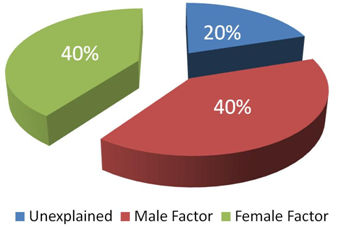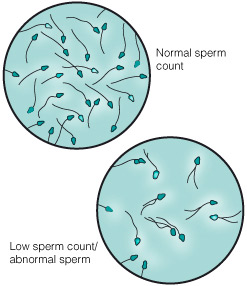Definition of Infertility
Infertility is a year or more of unprotected intercourse without pregnancy.
Primary infertility: Infertility without any previous pregnancy.
Secondary infertility: Fertility problems occurring in a couple that has conceived on their own.
Most childless couples with a female age under about 43-44 that are having problems getting pregnant are considered to be infertile but not sterile.
Incidence:
It is 12-15% of reproductive age groups.
Natural fertilization:
In females with regular & normal menstrual cycle (28+7 days), ovulation occurs in between 12-16th day of the cycle & ovum is picked up by fimbrial end of the fallopian tube. This ovum remains live for 24 hours & if there is intercourse during this period then released spermatozoa may fertilize the ovum if everything is normal, fertilization takes place in the fallopian tube and then zygote is transferred in the uterine cavity.
Causes of infertility:

The cause of infertility is sought by performing some fertility tests in a basic infertility evaluation. These tests can usually be completed over the course of one menstrual cycle (one month).
What causes infertility?
Most common causes of infertility problems:
- Ovulation dysfuction – PCOS
- Tubal Factor
- Male Factor
- Unexplained Infertility
less common causes of infertility:
- Endometriosis
- Uterine – Fibroids, Adenomyosis, Anomalies
- Previous tubal ligation surgery – tied tubes
- Previous vasectomy surgery
- Infertility associated with immunological problems
Female partner related causes of infertility:
- Ovarian: PCOD, Ovarian cysts, Chocolate cyst of ovary, premature ovarian failure.
- Tubal: Blocked tubes, Salpingitis isthemica nodosa
- Uterine: Uterine septum, various uterine malformations, Uterine Leiomyoma
- Cervical: Anti-sperm antibody
- Central (Hormonal): Hyperprolactinemia, Hypothyroidism,Hyperandrogenism.
- Endometriosis.
- Adhesions.
- Infection: Genital Tuberculosis, Chlamydia Infection
Male partner related causes of infertility:
- Absent sperms in semen sample.
- Reduced sperm count
- Reduced sperm movements
- Infection in semen sample
- Early ejaculation & ejaculatory failure
- Impotency
- Varicocele
- Infection




